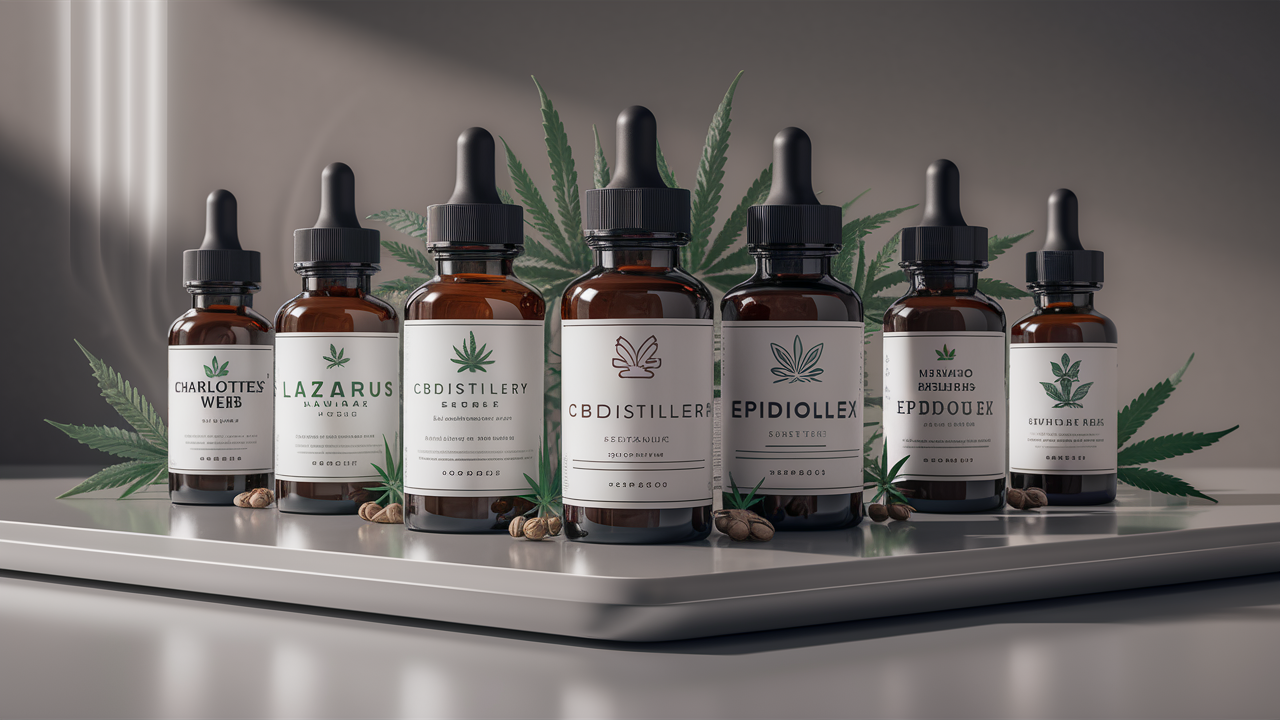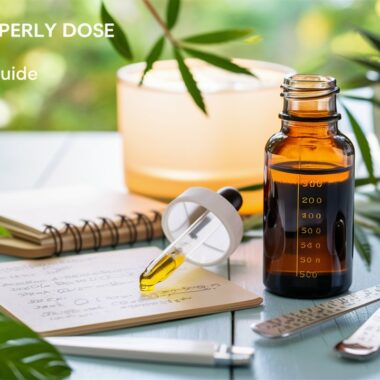CBD oil has gained popularity as a natural remedy for various health conditions, offering potential benefits for managing chronic pain, enhancing sleep quality, and reducing anxiety. Understanding how CBD interacts with the body can provide insights into its effectiveness and help individuals make informed choices.
1. CBD for Chronic Pain Relief
CBD oil is gaining traction for its potential in managing chronic pain. Pain, whether stemming from injuries, chronic illnesses, or other sources, can disrupt daily life. CBD’s interaction with the endocannabinoid system may offer relief by affecting pain transmission pathways.
Research suggests CBD can alleviate various pain types by reducing pain sensation. This makes it a potential option for those dealing with chronic conditions like arthritis, neuropathy, and back pain. CBD oil can target both the cause and symptoms of pain, offering a natural alternative with fewer side effects compared to traditional pain medications.
When selecting CBD oil for chronic pain, consider factors like potency and spectrum type. Full-spectrum oils benefit all hemp plant compounds, while broad-spectrum provides a THC-free alternative. CBD isolates contain pure CBD without other cannabinoids.
Third-party lab testing is crucial to ensure product quality and potency. A Certificate of Analysis (COA) provides insights into the cannabinoid profile and any contaminants present. Trustworthy brands make these available on their websites.
CBD oils marketed for pain relief often contain additional ingredients like turmeric or black pepper, known for their anti-inflammatory properties, enhancing the oil’s overall effectiveness.
Start with a lower dose, gradually increasing it until the desired effect is achieved. Sublingual administration allows for quicker absorption, which can be helpful for prompt relief from chronic pain episodes. Consult healthcare professionals, especially for those already taking other medications.
2. CBD Oil for Anxiety Disorders
CBD oil has shown promise as a potential solution for anxiety disorders, offering relief for those who might not respond well to traditional treatments. Its interaction with the endocannabinoid system can provide a more balanced and natural way to address anxiety.
Several studies have demonstrated CBD’s effectiveness in reducing anxiety symptoms. For instance, participants who took CBD before public speaking experienced significantly lower anxiety levels compared to those who took a placebo.
Unlike benzodiazepines and other anxiety medications, CBD offers a natural alternative with a more favorable safety profile, making it an attractive option for individuals seeking to manage anxiety without harsh side effects.
When selecting CBD oil for anxiety, consider potency, spectrum type, and additional supportive ingredients. Full-spectrum and broad-spectrum oils provide a range of cannabinoids that work together to manage anxiety, while CBD isolate offers pure CBD.
Look for brands that provide third-party lab testing results, ensuring the product’s purity, potency, and safety. A Certificate of Analysis (COA) verifies the cannabinoid content and checks for contaminants.
Start with a lower dose and gradually increase it while monitoring its effects. Sublingual administration is effective for quick absorption, offering prompt relief during anxiety spikes. Consult a healthcare professional for personalized guidance.
3. CBD for Better Sleep Quality
Getting a good night’s sleep is crucial for overall well-being. CBD oil is emerging as a natural alternative that can help improve sleep quality and reduce insomnia by interacting with the endocannabinoid system, which plays a key role in regulating sleep patterns and cycles.
Research suggests CBD’s potential in managing sleep disorders. One study indicated that CBD significantly improved sleep in individuals with chronic pain, providing dual benefits of pain relief and better sleep.
When choosing a CBD oil for sleep, consider the spectrum type and added supportive ingredients. Full-spectrum oils offer a comprehensive range of cannabinoids and terpenes that promote relaxation. Broad-spectrum options provide similar benefits without THC, while CBD isolate offers pure CBD.
- CBD oils formulated for sleep often include ingredients like melatonin or valerian root, which is known to promote relaxation. These natural sleep aids can work synergistically with CBD to create a potent sleep-inducing formula.
- Third-party lab testing ensures the product’s purity and potency. Certificates of Analysis (COAs) from reputable labs verify the CBD levels and absence of contaminants.
Start with a lower dose and gradually increase it until you find the amount that works best for you. Many users find that taking CBD oil about 30 minutes before bedtime helps them wind down and prepares their bodies for restful sleep. Sublingual administration ensures quicker absorption.
Integrate other sleep-promoting habits like maintaining a regular sleep schedule, creating a restful sleep environment, and reducing screen time before bed. Consult a healthcare professional for personalized guidance.
4. CBD Oil for Arthritis & Inflammation
For those dealing with arthritis and inflammation, CBD oil has emerged as a promising natural solution to reduce joint pain and inflammation.
CBD’s interaction with the endocannabinoid system can potentially modulate pain signaling and inflammation pathways, resulting in noticeable relief. Scientific research supports the use of CBD for arthritis, with studies suggesting its effectiveness in preventing osteoarthritis pain and joint neuropathy, as well as reducing inflammation in rats with arthritis.
When selecting a CBD oil for arthritis, choose full-spectrum oils for the entourage effect, which can amplify the oil’s therapeutic properties. Broad-spectrum oils offer similar benefits without THC, while CBD isolate provides pure CBD.
Look for products that include additional anti-inflammatory and pain-relieving botanicals like turmeric or essential oils, which can enhance the oil’s effectiveness through a powerful synergy with CBD.
Verify the quality and potency of any CBD product by checking for third-party lab testing and Certificates of Analysis (COA) to confirm the cannabinoid profile and absence of contaminants.
Start with a lower dose and gradually increase it to find the optimal amount that alleviates pain and reduces inflammation. Sublingual administration can provide prompt relief during flare-ups.
Integrate lifestyle changes like regular physical activity, balanced nutrition, and other anti-inflammatory practices to complement CBD’s effects and contribute to overall joint health and mobility.
5. CBD’s Role in Reducing Blood Pressure
High blood pressure, or hypertension, is a common cardiovascular condition that can lead to serious complications. Emerging evidence suggests that CBD oil can play a role in supporting cardiovascular health and reducing blood pressure levels, providing a natural alternative for managing hypertension.
CBD’s vasodilatory properties can improve blood flow and reduce arterial pressure, while its anti-anxiety effects can contribute to lowering stress-induced hypertension, creating a dual benefit for cardiovascular health.
Research has examined CBD’s impact on blood pressure, with one study finding that a single dose of CBD reduced resting blood pressure and the blood pressure response to stress in healthy volunteers.1
When selecting CBD oil for hypertension, look for full-spectrum oils for the combined benefits of all cannabinoids and terpenes. However, broad-spectrum oils or CBD isolates also provide substantial benefits.
Opt for brands that offer third-party lab testing, with available Certificates of Analysis (COAs) confirming the product’s cannabinoid profile and absence of contaminants, ensuring you’re using a high-quality, safe, and effective product.
Begin with a lower dose and monitor its effects, then gradually increase as needed while observing how your body responds. Sublingual administration is an effective method for quick absorption and prompt effects.
Integrate other heart-healthy practices like maintaining a balanced diet, regular physical activity, and managing stress through practices like meditation or yoga to complement the effects of CBD oil for comprehensive cardiovascular wellness.
Consult with a healthcare professional before incorporating CBD oil into your regimen, especially if you’re currently taking medication for hypertension or other cardiovascular conditions, to ensure it integrates smoothly with your existing health plan.
6. CBD for Treating Skin Conditions
CBD oil’s potential to address skin issues like acne and eczema is gaining attention in the wellness and skincare communities. Thanks to its anti-inflammatory properties, CBD oil applied topically can offer benefits for those looking to improve their skin health naturally.
The key lies in CBD’s interaction with the endocannabinoid system, which extends to the skin and helps regulate processes like inflammation and immune response. By influencing this system, CBD can potentially reduce inflammation, calm irritated skin, and promote healing, making it a promising option for common dermatological issues.
For acne, CBD oil can be beneficial. Acne often results from overactive sebaceous glands producing too much oil and clogging pores. CBD’s anti-inflammatory and sebum-regulating properties can help manage oil production, reducing the likelihood of breakouts. Its antibacterial properties may also inhibit acne-causing bacteria growth on the skin.
Those with eczema can find relief with CBD products. Eczema is characterized by dry, itchy, and inflamed skin, often resulting in discomfort. CBD’s ability to moisturize while reducing inflammation helps soothe the skin, alleviating symptoms and preventing flare-ups. By hydrating the skin and reducing the immune responses that trigger eczema, CBD can support healthy skin barriers.
When choosing a CBD product for skin conditions, topical applications like creams, balms, and lotions infused with CBD are key. Full-spectrum and broad-spectrum CBD products are often preferred for their range of cannabinoids and terpenes, which can enhance the anti-inflammatory and antibacterial effects through the entourage effect.
Quality and purity are essential for skincare products. Always opt for brands that provide third-party lab tests and COAs to confirm the product is free from harmful contaminants.
Incorporating additional skin-friendly ingredients like moisturizers and natural anti-inflammatory agents can further enhance the benefits of CBD topicals. Consistency is key, so incorporate the product into your daily skincare routine for the best results.
For chronic skin conditions, consulting with a dermatologist or healthcare professional can provide personalized guidance on using CBD.
7. CBD for Substance Use Disorder Treatment
CBD oil has emerged as a potential complementary option for those seeking alternative ways to support recovery from substance use disorder (SUD). Early research suggests that CBD might play a role in inhibiting the rewarding effects of addictive substances, offering hope for managing and overcoming dependence.
CBD’s interaction with the endocannabinoid system is key to its potential benefits for SUD. By modulating the brain’s response to addictive substances, CBD may help reduce cravings and withdrawal symptoms, making recovery smoother. Preliminary studies indicate that CBD might influence the reward pathways in the brain, which are heavily involved in addiction behaviors, potentially diminishing the satisfying effects associated with substances like tobacco, cocaine, and opioids.
Choosing the right CBD oil for SUD involves prioritizing quality and transparency. Opt for full-spectrum or broad-spectrum products to benefit from the entourage effect, which enhances CBD’s therapeutic properties. Ensuring the safety and efficacy of the CBD product is crucial. Look for brands that provide third-party lab testing and Certificates of Analysis (COAs).
Administering CBD oil in SUD treatment requires careful consideration of dosage and method of delivery. Sublingual administration ensures quick absorption and more immediate effects, which can be particularly beneficial during acute phases of withdrawal.
Integrating CBD oil into a comprehensive treatment plan is advised. This should include:
- Behavioral therapies
- Support groups
- Other conventional treatments tailored to the individual’s needs
CBD oil can serve as a complementary tool, helping to manage the psychological and physiological aspects of addiction.
Consulting with healthcare professionals who specialize in addiction treatment can provide personalized guidance. They can help approach potential interactions with other medications and ensure that the use of CBD oil aligns with the overall treatment strategy.
8. CBD Oil for Epilepsy
CBD oil has made its mark in the medical community with Epidiolex, an FDA-approved medication specifically formulated to treat two severe forms of epilepsy: Dravet syndrome and Lennox-Gastaut syndrome. This official recognition highlights CBD’s potential efficacy in managing seizures.
Clinical research underscores CBD’s role in epilepsy management. One study involved patients with treatment-resistant epilepsy who were administered CBD, with a significant reduction in seizure frequency observed in a majority of participants. This evidence supports the notion that CBD oil may offer a complementary option for those not fully benefiting from traditional anti-seizure medications.
Selecting the right CBD oil for epilepsy involves careful consideration of product quality and spectrum type. Full-spectrum CBD oils, which contain a mix of cannabinoids and terpenes, may offer enhanced benefits through the entourage effect. Transparency and product integrity are paramount when choosing CBD oil for epilepsy. Always opt for brands that offer third-party lab testing with Certificates of Analysis (COAs).
Finding the appropriate dosage is crucial. Starting with a lower dose and gradually increasing it under medical supervision helps determine the optimal amount that reduces seizure activity without causing adverse effects. Sublingual administration is effective for quick absorption, providing more immediate relief during seizures.
Integrating CBD oil into an existing epilepsy treatment plan should be done with the guidance of a healthcare professional. They can offer personalized advice and monitor for potential interactions with other anti-seizure medications.
9. CBD for Schizophrenia
CBD oil holds potential as a complementary therapy for schizophrenia, a severe mental health disorder characterized by distortions in thinking, perception, emotions, and behavior. Preliminary research hints that CBD may help manage positive psychotic symptoms—such as hallucinations and delusions—providing a new avenue for those seeking alternative or supplemental treatments.
One pivotal study highlighted that a daily dose of 1,000 milligrams of CBD oil reduced positive psychotic symptoms in individuals already undergoing conventional antipsychotic treatment. This suggests that CBD can be a supportive adjunct, potentially reducing the severity of hallucinations and delusions without the challenging side effects often associated with antipsychotic medications.
Choosing the right CBD oil for schizophrenia involves a careful evaluation of product quality, spectrum type, and safety. Full-spectrum CBD oils, rich in various cannabinoids and terpenes, may leverage the entourage effect to maximize the therapeutic benefits. However, for those concerned about even trace amounts of THC, broad-spectrum options can provide a similar range of cannabinoids minus THC, ensuring safety without sacrificing potential efficacy.
It’s crucial to select a product from a brand that offers third-party lab testing, providing a Certificate of Analysis (COA) that verifies cannabinoid content and tests for contaminants. This transparency is vital in ensuring that individuals with schizophrenia are using a safe and effective product, free from impurities that could potentially aggravate their condition.
Incorporating CBD oil into a treatment plan for schizophrenia requires cautious titration of dosage. Starting with a lower dose and gradually increasing it under professional supervision helps determine the optimal amount that alleviates symptoms without causing adverse effects. Sublingual administration ensures rapid absorption, facilitating quicker relief of acute psychotic episodes.
Engaging with a healthcare professional knowledgeable about CBD and schizophrenia is paramount. They can offer personalized advice, ensuring that CBD oil seamlessly integrates with traditional antipsychotic medications. This collaborative approach maximizes therapeutic outcomes while minimizing the risk of drug interactions or side effects.
While the potential of CBD oil in managing schizophrenia is promising, it should not be viewed as a standalone treatment. Further research is necessary to fully understand its efficacy and long-term effects. By opting for high-quality, third-party tested products and consulting with healthcare professionals, individuals with schizophrenia can explore the potential benefits of CBD oil as part of a comprehensive treatment plan aimed at enhancing their quality of life.
10. CBD for Digestive Disorders
Living with digestive disorders like Irritable Bowel Syndrome (IBS) and Crohn’s disease can severely impact one’s quality of life. CBD oil has shown promise in managing symptoms by reducing inflammation and supporting gut health. Though more research is needed, early indications suggest CBD could be a beneficial supplement for those dealing with these challenging conditions.
The gut’s intricate ecosystem, often referred to as the gut microbiome, plays a crucial role in overall health, influencing everything from digestion to immune function. An imbalance in this system can lead to chronic inflammation and other symptoms associated with digestive disorders. CBD’s interaction with the endocannabinoid system, which helps regulate bodily functions including immune responses and gastrointestinal processes, highlights its potential in fostering a healthier gut environment.
Inflammation is a significant factor in many digestive disorders. For conditions like Crohn’s disease, where inflammation in the digestive tract causes severe pain and other debilitating symptoms, CBD’s anti-inflammatory properties can be particularly beneficial. By modulating the immune response and reducing inflammation, CBD can help alleviate the discomfort and complications associated with these conditions.
IBS, characterized by symptoms like abdominal pain, bloating, and irregular bowel movements, may also benefit from CBD. Research suggests that CBD can influence gut motility and the overall function of the digestive system, potentially reducing IBS symptoms. Additionally, CBD’s ability to promote relaxation and reduce anxiety can further mitigate stress-related triggers of IBS, providing a holistic approach to managing the syndrome.
Choosing the right CBD oil involves considering the spectrum type and added beneficial ingredients:
- Full-spectrum CBD oils provide a range of cannabinoids and terpenes, enhancing therapeutic effects.
- Broad-spectrum products offer similar benefits without THC, making them ideal for those concerned about the compound.
- CBD isolate remains an option for those preferring a straightforward approach.
Product quality and transparency are essential. Opt for brands that offer third-party lab testing with Certificates of Analysis (COAs) detailing cannabinoid content and confirming the absence of contaminants like pesticides or heavy metals. Integrating additional beneficial botanicals like ginger and turmeric can enhance CBD’s effects on digestive health.
Dosing CBD oil should start low and gradually increase to find the optimal amount. Sublingual administration ensures quicker absorption, allowing for more immediate symptom alleviation. Consistency is key, so incorporating CBD oil into a daily routine can help maintain a balanced gut environment and manage chronic symptoms.
Consult a healthcare professional before starting CBD, especially if you are on medication for digestive conditions or have complex health needs. They can offer personalized guidance, helping to safely integrate CBD into your treatment plan.
Exploring high-quality, third-party tested CBD products provides a natural approach to managing digestive disorders. By choosing the right product and following a thoughtful approach, you can support your gut health and improve your overall well-being.
By integrating high-quality, third-party-tested CBD products into your daily regimen, you can harness the natural benefits of this compound to improve various aspects of your health. Always consult with healthcare professionals to customize the most effective approach for your unique needs.
- CBD Dosage: How Much Should You Take? - October 5, 2024
- The Ultimate Pot Brownie Recipe: A Step-by-Step Guide - October 5, 2024
- CBD-Infused Beverages: A Sober Exploration of the Trend - October 5, 2024
















